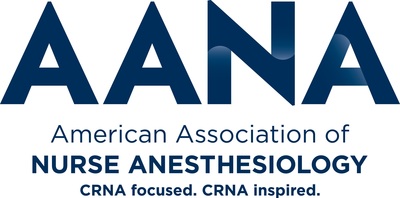Rule Change by the Centers for Medicare & Medicaid Services Recognizes CRNAs’ Expert Care
The final rule also includes a provision that finalizes broad modifications to CMS's documentation policy for evaluation and management services so that CRNAs, along with other APRNs, physicians, and physician assistants, can review and verify, rather than re-document notes in a patient's medical record. The preamble related to this provision of the rule recognizes Medicare Part B payment to CRNAs for evaluation and management services as defined by a state's scope of practice. The policy changes implement key provisions of
"The voices of our membership have been acknowledged," said
"CRNAs are advanced practice registered nurses who perform anesthesia risk assessment routinely in hospitals across the country," said Moore. CRNAs also are recognized to evaluate patients prior to discharge.
"We are grateful and strongly support CMS's action, which promotes key regulatory efficiencies and consistencies and adherence to standards in nursing practices," said
Nurse anesthetists have provided anesthesia in
In anticipation of the rule change, CRNAs sent more than 3,600 comments to the CMS. The following comment appeared in an excerpt from the preamble of the rule:
"The comments addressing the proposed regulatory change to allow either a physician or an anesthetist to examine the patient immediately before surgery to evaluate the risk of anesthesia and of the procedure to be performed were split between support and opposition. However, the majority of commenters supported the change to allow anesthetists, in addition to physicians, to evaluate patients before surgery for anesthesia risk."
CRNAs are Medicare Part B providers and, since 1989, have billed Medicare directly for 100 percent of the physician fee schedule amount for services.
The Medicare Part A Ambulatory Surgical Center (ASC) Conditions for Coverage (CfC) are federal regulations in which ASCs must comply in order to participate in the Medicare program. CMS's proposal addressed the ASC CfC requirement for anesthetic risk and evaluation of the patient to be performed by a physician immediately before surgery. The rule change enables CRNAs to provide the same pre-anesthesia assessment services for patients in ASCs—a manner consistent with CRNAs and physicians conducting these services for a patient in a hospital. Under a hospital's Conditions for Participation for anesthesia services, CRNAs are recognized to perform the pre-anesthesia evaluation for patients presenting a greater range of complexity and multiple chronic conditions than ASC patients. Precluding a CRNA from being recognized for performing an essential function within the CRNA's scope of practice may place a surgeon in the position of evaluating an aspect of care outside that surgeon's field of expertise, and it inhibits the facility's ability to determine who provides the preanesthetic evaluation.
About the
Founded in 1931 and located in
View original content to download multimedia:http://www.prnewswire.com/news-releases/rule-change-by-the-centers-for-medicare--medicaid-services-recognizes-crnas-expert-care-300953182.html
SOURCE





The slippery slope of more public records loopholes in Florida | The Buzz
World Markets for Smart Homes & Home Automation, 2019 to 2023 – Opportunities in Cloud-based Systems and the Integrated Hub – ResearchAndMarkets.com
Advisor News
- Wealth management: why some insurance companies are opting out of a lucrative opportunity
- Middle-income households exceeding retirement savings expectations
- How SECURE impacts inherited IRA beneficiaries
- 62% of workers face serious financial anxieties
- Nearly half of retirees lack a structured decumulation strategy
More Advisor NewsAnnuity News
Health/Employee Benefits News
- Millions will see rise in health insurance premiums if federal subsidies expire
- Festive event educates residents on health plans and privacy protections
- Are partnerships the answer to the long-term care crisis?
- Health insurers enhance security following UnitedHealthcare CEO shooting
- Federal judge blocks rule that would have given DACA recipients access to Affordable Care Act coverage
More Health/Employee Benefits NewsLife Insurance News